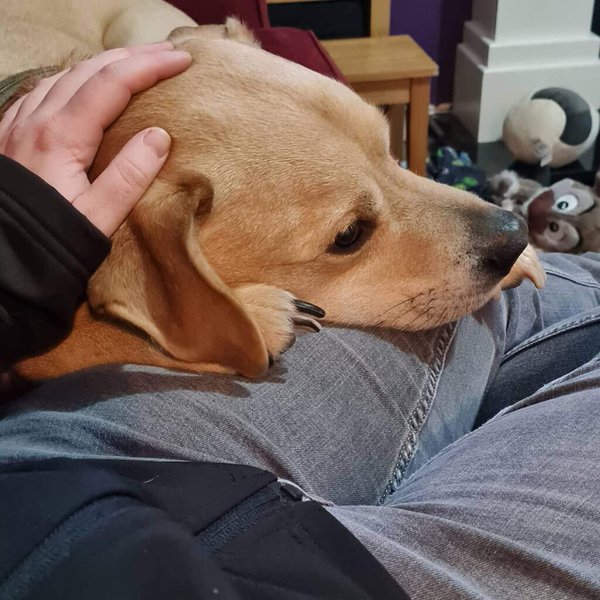As a dog owner, you’ll sometimes notice some changes in your dog’s behavior that prompt you to ask yourself whether your canine buddy is depressed. But is it even possible for dogs to get depressed?
Yes, it is very possible for dogs to get depressed. Just like in humans, depression in dogs can be caused by a wide variety of factors. Very often, the symptoms of depression in dogs are similar to the symptoms of other illnesses, so it is advisable to have the problem diagnosed by a vet.
If you are worried that your dog is depressed, you’ve definitely asked yourself questions like, “Why is my dog sad all of a sudden?”, “What does it mean if my dog is sad?” or “Is my dog depressed or sick?”
In this article, we will provide you with answers to all the above questions. We will also cover other relevant information about depression in dogs, including whether dogs grieve their companions, how to fix depression in dogs, how to cheer up a grieving dog, how to deal with conditions like Addison’s Disease, and so much more.
Before getting into all that, however, let’s look at the most crucial thing when it comes to dealing with a depressed dog. So, how do you tell that your dog is depressed?
What Are The Signs Of Depression In A Dog?
Some of the signs of depression in dogs include:
- Changes in appetite
- Changes in sleeping habits
- Loss of interest in activities
- Hiding and avoidance
- Aggression
- Potty accidents
- Paw licking
- Destructive behavior
Let’s take a deeper look into each of these signs.

Changes In Appetite
Just like people, dogs will experience changes in appetite when they are depressed. Most dogs will lose appetite, and will even refuse foods and dog treats that they loved previously. Some dogs, on the other hand, will start eating more than they did previously.
Depending on whether your canine buddy has lost or gained appetite, they could gain or lose weight.
Changes In Sleeping Habits
Dogs require more sleep than us, and it is totally normal for your dog to sleep for up to 14 hours a day. However, if you notice that your canine buddy is sleeping all the time, even when you’re around, this could be a sign of depression.
Loss Of Interest In Activities
If a dog who used to be excited about going out for walks and drives or going out to play suddenly seems uninterested in these activities, there is a high chance that the dog is depressed.
Hiding And Avoidance
Is your dog suddenly spending all their time hiding in a dark corner of the room? This is a sign that your dog wants to be left alone, and can either be caused by depression, injury, or illness.
Aggressive Behavior
If a canine who was previously soft and mellow is suddenly reacting with aggression to every person or animal they come across, depression could be the reason behind this change in behavior.
Potty Accidents
Is your house-trained dog suddenly doing its business inside the house? Stress and depression can make it difficult for dogs to control their bowel movements, resulting in potty accidents.
Licking Their Paws
Licking or chewing the paws is an instinctive action that dogs perform when they are trying to soothe themselves. If your fido is spending a lot of time licking their paws, this is a sign that something is bothering them mentally.
Destructive Behavior
It is totally normal for puppies to want to chew everything they come across. Fortunately, they outgrow this behavior pretty quickly. However, if you have an adult dog that has suddenly started chewing and scratching at everything, this behavior could be caused by depression.
Can Dogs Become Suicidal?
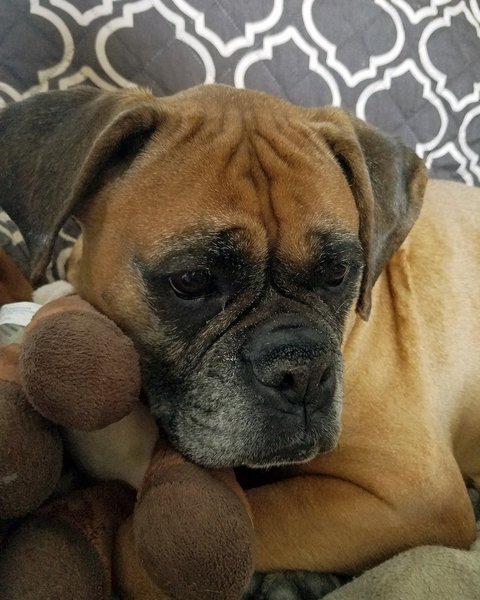
No, dogs cannot become suicidal in the literal sense of the word. They can’t consciously make the decision to end their lives. However, depression can cause your dog to engage in behaviors that can result in their death.
In order for an act to be considered suicidal, the individual needs to be aware that the act will lead to their death. However, dogs do not have a conscious understanding of the concept of life and death, so it is unlikely that a dog will actively commit suicide.
In addition, when people commit suicide, they analyze between life and death before concluding that death is preferable to the pain they are going through while alive. Dogs do not possess the kind of abstract thinking required to weigh the benefits of life and death and choose one over the other.
That said, it is still possible for a dog suffering from depression to engage in self-destructive behavior that can ultimately lead to their death. For instance, a depressed dog can reject food until they die of starvation.
Even though the dog eventually ends up dead, they did not reject food knowing that it will lead to death. Rejecting food was simply their way of dealing with their depression.
Why Is My Dog Sad All Of A Sudden?
Sadness and depression in dogs can be caused by things like changes in the environment, changes to their social group, weather and seasonal changes, physical illness or pain, and loss of a companion.
Let’s see how these factors affect your canine buddy.
Changes To The Environment
Dogs are creatures that love routine and can be greatly affected by any rapid and significant changes in their day-to-day life.
Things like moving to a new house, making significant changes to your house or home, being left alone when they were used to lots of company, or the sudden introduction of loud noises around the home, can all make your dog anxious and uncertain.
Sometimes, this can gradually develop into full-blown depression.

Changes To Their Social Group
Dogs are very good at forming strong bonds with their social circle. When disruptions occur to these social groups, these disruptions greatly affect your four-legged buddy and can easily lead to depression.
Changes in your dog’s social circle can be caused by a family member moving out of the house, the addition of a new member to the family (including babies), children leaving for boarding school, the addition of a new pet, and so on.
Weather And Seasonal Changes
Changes in weather and seasons have been shown to affect dogs’ moods, and in extreme cases, these changes can lead to depression.
For instance, during winter, a lot of dogs experience a condition known as Seasonal Affective Disorder, which causes them to become moody and less energetic.
Physical Illness Or Pain
Sometimes, your doggie’s mental condition can have physical roots. If your dog is ill, or if they are experiencing lots of pain from something like an injury, this can affect their moods and eventually lead to depression.
Loss Of A Companion
Due to their ability to form strong emotional bonds, dogs are greatly affected when a person or animal they were close to dies. There are numerous cases of dogs who have fallen into depression following their owners’ demise.
What Does It Mean If My Dog Is Sad?
If your dog seems sad, this is a sign that they are responding to some unexpected and unfavorable changes to their surroundings or routine.
While dogs are capable of experiencing a wider range of emotions than most other animals, their emotions are not as nuanced as those of humans.
For instance, humans can get sad from thinking about something that happened a long time ago, or from seeing another person being treated badly.
Dogs’ emotions are not as nuanced as this, which means that whenever your furry buddy seems sad, the sadness has been caused by something in their immediate environment.

Why Does My Puppy Seem Sad?
Apart from the normal issues that cause depression in dogs, your puppy can also be feeling sad due to loneliness, fear, or change.
Loneliness
If you’ve just brought a new puppy home, the puppy was separated from its mother and siblings just as they were starting to form bonds with them. At the same time, the puppy has not formed any bonds with you or the rest of the family. This leaves the puppy feeling lonely, which can make them sad.

Change
Aside from being separated from their mother and siblings, the puppy also has to deal with the change of moving to a new home, meeting new people, and so on. This can easily affect your pup’s moods and leave them feeling sad.
Fear
As they start growing older, puppies will experience fear periods. If they are not properly socialized prior to and during these fear periods, the puppies will react to all unfamiliar situations with fear. If they are feeling fearful most of the time, the puppy will start showing signs of sadness.
The key to preventing this is to socialize your puppy from a young age to build their confidence.
Why Does My Dog Look Sad And Weak?
If your dog looks sad and weak, this is a sign that there is something wrong with its body. Sadness accompanied by weakness in dogs can be caused by infections, organic and metabolic diseases, or medications.
Infections
Infections will affect your furry buddy’s moods and leave them feeling weak. Some common infections that could make your dear fido sad and weak include parvovirus, heartworm disease, kennel cough, and distemper.
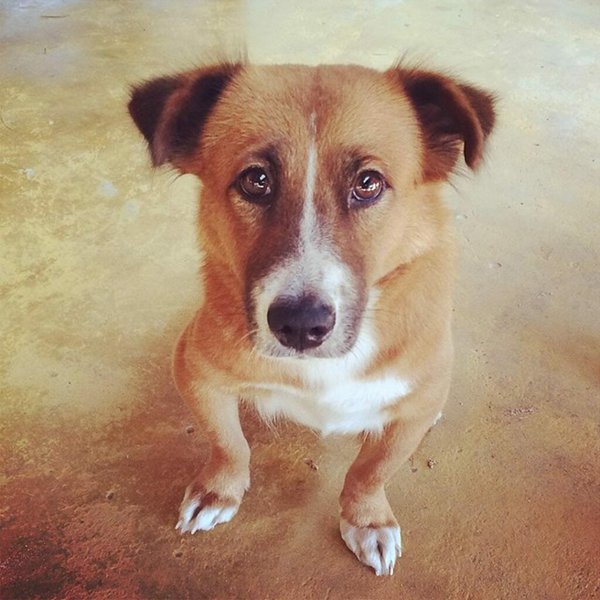
Organic And Metabolic Diseases
Weakness and sadness in dogs can also be caused by chronic conditions affecting the dog’s organs or metabolism. Some common conditions that will make your pooch weak and lethargic include cardiac problems, diabetes, hypoglycemia, and liver problems.
Medications
If your dog is taking some medications, the drugs could be the reason for your pooch’s weakness and moodiness. If you notice that your dear fido has suddenly become weak after using a certain medication, you should get in touch with your vet immediately.
You should also avoid giving your dog medications meant for humans since they could be toxic to your dog and can easily lead to death.
Other Causes
Other causes of sadness and weakness in dogs include tumors, pain and trauma, anemia, acute or chronic diarrhea, anal gland problems, and poisoning. Many of these conditions can be fatal if left untreated, so you should quickly get in touch with your vet if your dog looks sad and weak.
Is My Dog Depressed Or Sick?
Many of the symptoms of depression in dogs overlap with the symptoms of various illnesses, so it is quite easy to confuse sickness for depression or vice versa. To avoid this, it is always advisable to have your pooch checked by a vet for the problem to be diagnosed accurately.
Dogs cannot talk and inform you whether they are sick or depressed, so dog owners usually rely on observation to determine what their beloved pooch is going through. Unfortunately, what appears to be symptoms of depression can just as easily be symptoms of physical illness.
For instance, if a dog who was previously active suddenly becomes uninterested in playing and going for walks, you could easily assume that they are going through depression. However, the dog could be uninterested in any activities because they have arthritis that is making walking or playing painful for them.
Similarly, if your pooch has suddenly lost appetite, it’d be very easy to assume that they are depressed. However, loss of appetite could also be caused by other problems such as intestinal parasites.
To avoid ignoring problems that could be fatal for your canine buddy, never assume that your dog is depressed just because you’ve observed some behavior changes. Instead, you should take your pooch to the vet so that they can determine whether the dog is sick or depressed.

Why Is My Dog Acting Sad And Shaking?
If your dog is acting sad and shaking, this could be caused by several things, including fear and anxiety, nausea, generalized tremor syndrome, distemper, or Addison’s disease.
Fear And Anxiety
When experiencing an intense bout of fear or anxiety, it is common for some dogs to shiver and show a sad face. In this case, the shivering itself is unlikely to cause your dear fido any harm. However, if the fear and anxiety persist for extended periods, it can easily lead to depression.
The best course of action if your dog is experiencing fear and anxiety is to take them from the situation causing their fear.

Nausea
Many dogs will also shake and act sad when they are nauseous. The nausea can be caused by eating something toxic, excessive eating, medication, or motion sickness. Some dogs will also be nauseous and shake when they have liver or kidney disease.
Generalized Tremor Syndrome
Also known as white shaker dog syndrome, generalized tremor syndrome is a condition that affects the covering of the cerebellum and spinal cord, causing dogs to shake uncontrollably.
Distemper
Distemper is a highly contagious viral disease that commonly affects unvaccinated puppies and adolescent dogs. One of the common symptoms of distemper in dogs is shaking. The shaking is usually accompanied by other symptoms such as coughing, fever, and producing a discharge from the eyes and nose.
Addison’s Disease
Also referred to as hypoadrenocorticism, Addison’s disease is a disease that is caused by improper functioning of the adrenal glands. These are the glands that produce various hormones that are responsible for regulating many of the body’s functions.
Addison’s disease is one of the major causes of shaking in dogs. We will look at the other symptoms of Addison’s disease later in the article.
Do Dogs Feel Sad When Another Pet Dies?
Yes, dogs can feel sad and experience grief when a pet close to them, or even a person they were close to dies.
There have been numerous stories of dogs getting sad and depressed when their owner or a close member of the family dies.
However, dogs will also feel sad when another pet dies, provided they were close to the pet and used to interact a lot. If they were not close to the deceased pet, they won’t show any signs of sadness or grief.
Some of the signs and symptoms of a dog that is grieving the loss of another pet include loss of appetite, sudden destructive or aggressive behaviors, withdrawing from members of the family and other pets, vocalizing in an attempt to call out for the deceased pet, and sleeping more than usual.
You’ll also notice grieving dogs searching for the deceased pet in areas where the pet used to frequent. Some grieving dogs will also become very clingy.

What Are The Symptoms Of Addison’s Disease In Dogs?
Diagnosing Addison’s disease can be very difficult due to the fact that many of the symptoms associated with the disease are also linked to many other illnesses in dogs.
Some of the symptoms that dogs with Addison’s disease will exhibit can include:
- Tremors and shaking
- Depression
- Loss of appetite
- Weakness and lethargy
- Loss of hair
- Vomiting and diarrhea
- Weight loss
- Painful abdomen
- Weak pulse
- Dehydration
- Increased thirst and increased urination
- Bloody stool
- Irregular heart rate

Are Dogs Born With Addison’s Disease?
Addison’s disease is not a congenital disease, which means dogs are not born with it. In most cases, the disease develops when a dog is between 4 to 6 years old, though it can also occur in younger or older dogs.
The disease is mainly caused by a dog’s immune system destroying the tissue of the adrenal glands. Sometimes, the disease can also be triggered by damage to the adrenal tissue that could be caused by cancer, infection, or trauma.
Fortunately, Addison’s disease is very rare in dogs, though it can affect any dog breed.
Dogs with Addison’s disease are very poor at dealing with stress, so it is very important to quickly treat your dog’s depression if they’re also suffering from Addison’s disease. So, how do you treat depression in dogs?
How Do I Fix My Dog’s Depression?
To fix your dog’s depression, you should show your dog some extra love, be patient with them, rule out medical issues, and if all else fails, get your dog medication for their depression.
Show Your Dog Some Extra Love
If your dog is going through depression, giving them some extra love and attention can help them get out of it. Spend time with them, give them their favorite treats, and generally find opportunities to bond with them.
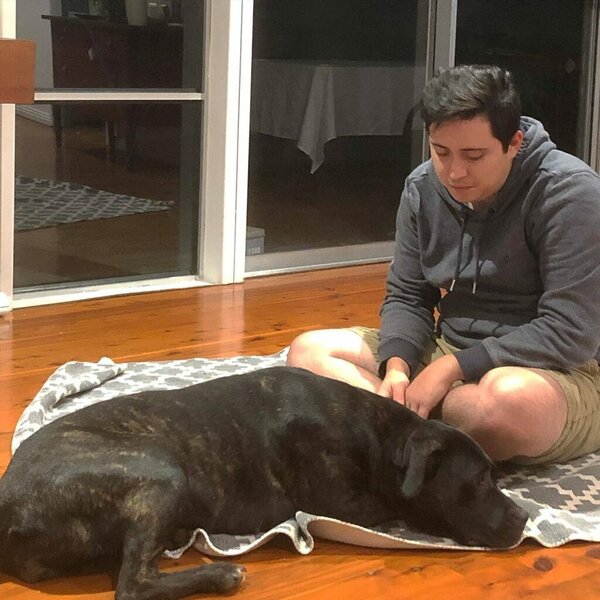
Be Patient
Time is a great healer, and very often, it will take time for your canine buddy to pull themselves out of depression. As they battle their depression, be patient with them and be there for them.
Rule Out Medical Issues
Sometimes, what you think is depression could actually be a medical issue that is troubling your pooch. Therefore, you should have your doggie checked out by a vet to ensure that they’re not sick.
Get Anti-Depression Medication
If everything else doesn’t work, your only remaining option will be to get depression medications for your dear fido. Some drugs that are used to treat depression in dogs include fluoxetine, doxepin, and amitriptyline.
How Do I Make My Dog Happy?
Some of the things you can do to keep your dog happy and keep depression at bay include giving a healthy and proper diet, giving multivitamin supplements, and ensuring your dog gets adequate exercise.
Healthy And Proper Diet
Giving your dog a healthy and proper diet makes them better equipped to deal with stressors and can help prevent depression.
If you’re wondering what to feed your dog, we recommend Pet Plate’s Barkin’ Beef. The Barkin’ Beef recipe is made with multiple ingredients, including beef, beef liver, apples, carrots, pumpkin, sweet potatoes, and salmon oil, thus ensuring that your doggie will get all the nutrients they need.
Multivitamin Supplements
Giving multivitamin supplements can also help keep your pooch happy, boost their immunity and keep them out of the doldrums.
Multivitamin Treats Supplements from Zesty Paws Probiotics are a particularly great option. These supplements are good for your dog’s gut health and immunity and will help keep away illnesses that could lead to depression.
Adequate Exercise
Dogs also require adequate exercise on a regular basis, so scheduling regular visits to the dog park is a surefire way of keeping your pooch happy. If you have a yard, you can also get your dog Chew King Fetch Balls and enjoy a game of fetch while keeping your dog happy and healthy.
How Do You Cheer Up A Grieving Dog?
You can cheer up a grieving dog by giving them some alone time, getting them a new friend or organizing fun playdates, and generally being there for your dog.
Allow Some Alone Time
It is totally normal for your dog to want to spend time alone after losing someone close to them. If you notice that your dog wants to be left alone, give them the time they need, and only spend time with them when they want it.
Forcing the dog to spend time with you even when they don’t want to can make things harder for them.
Get Them Another Friend
If your dog is grieving the loss of another dog, you can make things easier for them by getting another dog. Having another dog to play with can make it easier for your dog to overcome their grief.
If it is not possible for you to get another dog, you can organize some play dates for your dog to meet and make new friends and have some fun.
Be There For Your Dog
The most important thing you can do to help cheer up a grieving dog is to be there for them when they need your love and attention. Knowing that they have someone else they can count on will help them overcome their grief quickly.
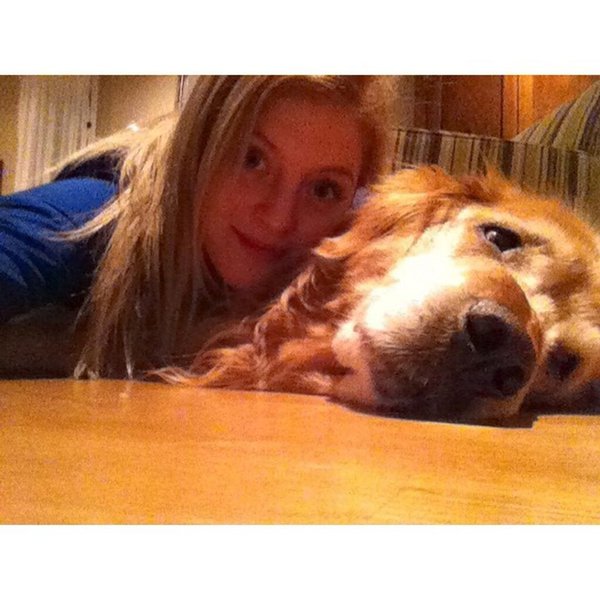
How Much Does It Cost To Treat Addison’s Disease In Dogs?
The cost of treating Addison’s disease can be anywhere between $50 to $200 per month, depending on the size of your dog, how severe their condition is, how they are responding to treatment, and so on.
The dosage of drugs for treating Addison’s disease varies depending on the size of the dog, so those with bigger dogs will spend more on drugs than those with smaller dogs.
If the condition is in advanced stages, your dog will also need more frequent lab work and monitoring, and more trips to the vet, which can drive up the costs.
In addition, your dog’s response to the treatment will determine which drugs your dog will be given. Different drugs have different costs, so this will also affect treatment costs.
How Long Can Dogs Live With Addison’s Disease?
Dogs with Addison’s disease will require medication and regular check-ups for the rest of their lives. However, if appropriate treatment is started early, dogs with Addison’s can still have long and happy lives like their healthier counterparts.

Do Dogs Sense Sadness?
Yes, it is possible for dogs to sense sadness by looking at our postures, facial expressions, mood, and the odors we’re giving off.
Various studies have shown that dogs’ emotions tend to mirror the emotions of their owners. If you are sad and stressed, there is a very high chance that your dog will also feel sad and stressed. This is because dogs are very good at reading the emotions of humans.
Even though your dog doesn’t understand that what you’re feeling is sadness, or why you are sad, they do realize that you’re going through negative emotions. Many dogs will even actively try to comfort and cheer up their owners when they are feeling sad.
